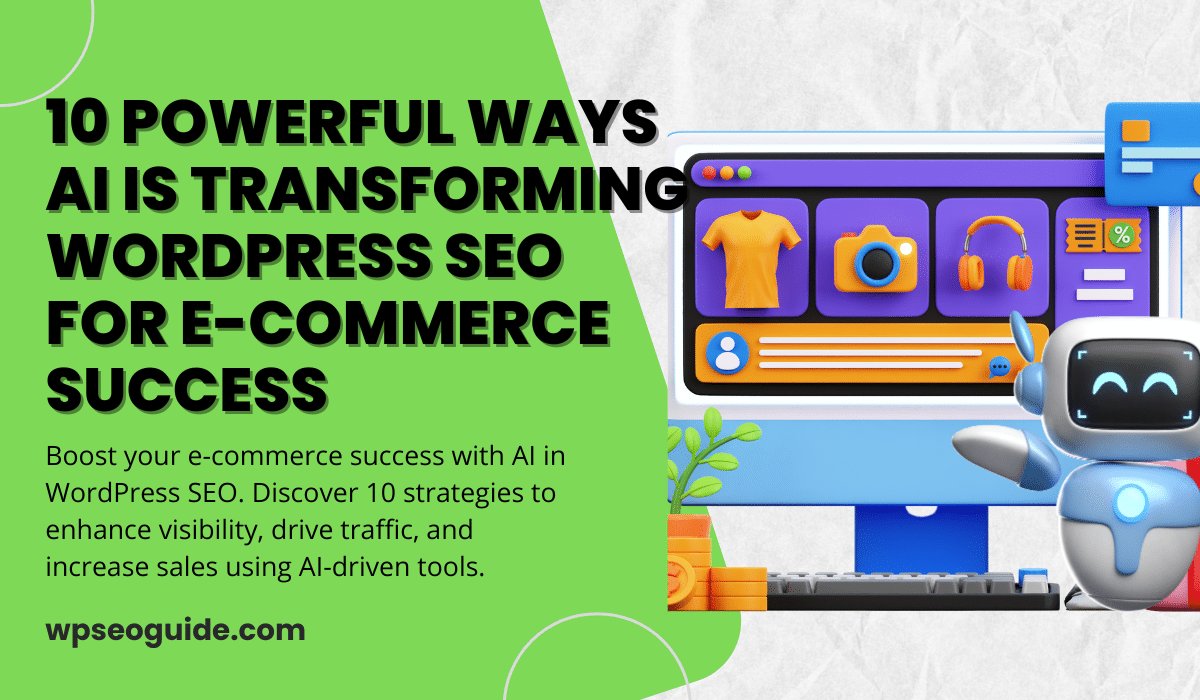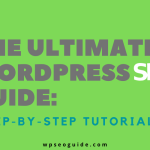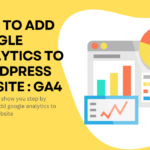1. Introduction
In today’s digital world, artificial intelligence (AI) has become a game-changer across various industries. From healthcare to finance, AI is transforming how businesses operate, and e-commerce is no exception. For e-commerce websites, search engine optimization (SEO) is essential for driving visibility, traffic, and sales. With competition fiercer than ever, leveraging AI in WordPress SEO for e-commerce has become a crucial strategy for staying ahead. This article dives into how AI is reshaping WordPress SEO, offering practical tips on how you can use this technology to boost your e-commerce success.
2. Understanding AI in the Context of SEO
At its core, AI refers to the simulation of human intelligence by machines, particularly computer systems. In digital marketing, AI has applications ranging from machine learning to natural language processing, all aimed at making processes more efficient. When it comes to SEO strategies, AI tools analyze massive amounts of data, spot patterns, and automate tasks that would otherwise be time-consuming or impossible. As AI advances, it’s fundamentally changing the SEO landscape, making it more data-driven and personalized. If you’re looking to integrate AI in WordPress SEO for e-commerce, now is the time to start.
3. AI-Driven Keyword Research
Keyword research is a cornerstone of effective SEO, and AI has revolutionized this process. AI-powered tools can sift through extensive datasets to identify high-converting keywords, predict trends, and offer insights that traditional methods might miss. For e-commerce sites, where competition is fierce, AI-driven keyword research can be a game-changer. Using predictive analytics, these tools can forecast which keywords will gain traction, enabling you to target them before they become too competitive. In case studies, companies using AI in WordPress SEO for e-commerce have seen significant improvements in traffic and conversions, underscoring the power of AI in this area.
4. Content Creation and Optimization with AI
When it comes to SEO, content is king. AI is enhancing how content is created and optimized for search engines. AI tools can generate SEO-friendly content by analyzing top-performing articles, identifying key elements, and applying those insights to new content. Additionally, AI can automate tasks like keyword placement, meta tag creation, and readability improvements. This ensures that your content appeals to both search engines and readers. By using AI in WordPress SEO for e-commerce, you can enhance the quality and relevance of your content, leading to higher engagement rates and better search engine rankings.
5. AI-Powered On-Page SEO
On-page SEO is all about optimizing individual web pages to rank higher in search engine results. AI plays a pivotal role here by automating various aspects of on-page optimization. For example, AI can generate and optimize meta tags based on your page’s content, ensuring they’re both relevant and compelling. AI tools can also offer smart internal linking suggestions, which improve your website’s structure and make it easier for search engines to crawl. Furthermore, AI can conduct real-time SEO audits, identifying issues and offering actionable recommendations. By integrating AI in WordPress SEO for e-commerce, you can make immediate, impactful improvements to your site.
6. Enhancing User Experience with AI
User experience (UX) is a critical component of SEO, as search engines prioritize websites that offer a seamless experience. AI-driven personalization is a powerful tool for improving UX, allowing e-commerce sites to tailor content, product recommendations, and even search results based on individual user behavior. AI can also improve site speed and mobile-friendliness, both essential for maintaining high search engine rankings. By analyzing user behavior, AI can identify pain points and suggest adjustments, enhancing the overall user experience and driving better engagement. Implementing AI in WordPress SEO for e-commerce is a smart move to keep users satisfied and returning.
7. AI in E-Commerce Product Optimization
In e-commerce, product optimization is crucial for ensuring that products are easily discoverable by potential customers. AI can optimize product descriptions and titles by analyzing search trends and customer preferences, creating content that resonates with your audience. AI can also automate image SEO, ensuring that product images are properly tagged and formatted for optimal performance. Schema markup, which helps search engines understand your content, can be enhanced with AI, improving product visibility in search results. Using AI in WordPress SEO for e-commerce can significantly boost your product optimization efforts, driving more traffic and sales.
8. AI-Enhanced Technical SEO
Technical SEO focuses on optimizing the infrastructure of your website to ensure that search engines can easily crawl and index your content. AI tools are invaluable in this area, automating processes like crawling and indexing optimization, and identifying issues that could affect your rankings. For instance, AI can detect and fix broken links, optimize site architecture, and ensure that your site is mobile-friendly. By continuously monitoring your site’s health, AI provides real-time alerts and recommendations, helping you maintain optimal performance. Leveraging AI in WordPress SEO for e-commerce ensures your site stays technically sound and competitive.
9. AI-Powered Analytics and Reporting
Effective SEO relies on data-driven decision-making, and AI excels in providing comprehensive analytics and reporting. AI-powered tools can analyze vast amounts of data, offering insights into your website’s performance, user behavior, and the effectiveness of your SEO efforts. Predictive analysis allows you to anticipate future trends and adjust your strategies accordingly. With real-time data and continuous feedback, AI empowers you to make informed decisions, optimize your SEO, and achieve better results over time. Using AI in WordPress SEO for e-commerce means you’re always one step ahead of the competition.
10. Case Studies: Success Stories of AI in WordPress E-Commerce SEO
Numerous e-commerce websites have successfully integrated AI into their WordPress SEO strategies, leading to significant improvements in traffic, engagement, and sales. For instance, a leading online fashion retailer used AI-driven keyword research and content optimization tools, resulting in a 50% increase in organic traffic and a 30% boost in conversion rates. Another e-commerce site specializing in electronics employed AI-powered technical SEO tools to optimize its site architecture and improve loading times, leading to a 40% reduction in bounce rates. These case studies highlight the tangible benefits of using AI in WordPress SEO for e-commerce.
11. Challenges and Considerations
While AI offers many benefits for WordPress SEO, it’s important to be aware of potential challenges. One major risk is over-reliance on AI, which can lead to a lack of human oversight and creativity. It’s essential to balance AI automation with human input to ensure your SEO strategy remains flexible and effective. Additionally, there are ethical considerations, such as data privacy and the potential for AI to perpetuate biases. By addressing these challenges, you can use AI in WordPress SEO for e-commerce responsibly and effectively.
12. Future Trends in AI and E-Commerce SEO
As AI continues to evolve, its role in SEO strategies will only grow. Emerging technologies, like voice search optimization and AI-driven chatbots, are set to shape the future of e-commerce SEO. These advancements will enable even more personalized and efficient customer experiences, enhancing your competitive edge. To stay ahead, you’ll need to adopt new AI technologies and continuously refine your strategies. Embracing AI in WordPress SEO for e-commerce is not just about keeping up—it’sabout leading the way.
13. Conclusion
AI is revolutionizing WordPress SEO for e-commerce sites, offering powerful tools that drive visibility, traffic, and sales. By integrating AI into your SEO strategy, you can enhance keyword research, content creation, on-page optimization, user experience, and technical SEO efforts. However, it’s crucial to balance AI with human oversight and consider ethical implications to ensure long-term success. As AI technology advances, staying informed and adaptable will be key to maintaining your competitive edge in the ever-evolving world of e-commerce SEO.
FAQ
1. How can AI improve my WordPress e-commerce site’s SEO?
AI can enhance your WordPress e-commerce site’s SEO by automating keyword research, optimizing content for search engines, improving technical SEO, and providing real-time data analytics. AI tools analyze large datasets to identify high-converting keywords, suggest content improvements, and monitor your website’s performance, enabling data-driven decisions that boost your site’s visibility and rankings.
2. Are AI tools expensive to integrate into my SEO strategy?
The cost of integrating AI tools varies depending on the tools and services you choose. Some AI tools are available for free or at a low cost, while others may require a subscription or a one-time purchase. The investment in AI in WordPress SEO for e-commerce can be justified by the time saved and the potential increase in traffic and sales.
3. Can AI replace the need for an SEO expert?
AI can automate many aspects of SEO, but it does not fully replace the need for human expertise. An SEO expert provides strategic insights, creativity, and problem-solving skills that AI cannot replicate. The best approach is to use AI in WordPress SEO for e-commerce to enhance and support the work of an SEO expert, allowing them to focus on higher-level strategy and decision-making.
4. What are the risks of relying too much on AI for SEO?
Over-reliance on AI for SEO can lead to a lack of human oversight, potential biases in AI algorithms, and a loss of creativity in content creation. Additionally, AI tools may not always understand the nuances of your brand or industry. It’s important to balance AI in WordPress SEO for e-commerce with human input to mitigate these risks.
5. How does AI help with keyword research?
AI helps with keyword research by analyzing large volumes of search data to identify keywords that are likely to drive traffic and conversions. AI tools can predict keyword trends, suggest related keywords, and evaluate the competition for specific terms. This allows businesses to target the most effective keywords for their e-commerce site, improving their chances of ranking higher in search engine results.
6. What are the future trends in AI for e-commerce SEO?
Future trends in AI for e-commerce SEO include voice search optimization, AI-driven chatbots, and more advanced personalization techniques. As AI continues to evolve, it will enable even more precise targeting, improved customer experiences, and better optimization strategies. Staying up-to-date with these trends will be crucial for businesses looking to maintain a competitive edge.
7. How can AI improve the user experience on my e-commerce site?
AI can enhance the user experience by personalizing content, product recommendations, and search results based on individual user behavior. It can also optimize site speed and mobile-friendliness, both of which are critical for maintaining high search engine rankings and providing a seamless experience for users. By analyzing user behavior, AI can identify areas for improvement and suggest adjustments to enhance overall site usability.
8. Are there ethical concerns with using AI in SEO?
Yes, there are ethical concerns with using AI in SEO, particularly regarding data privacy and the potential for AI algorithms to perpetuate biases. It’s important to use AI in WordPress SEO for e-commerce responsibly, ensuring that data is handled securely and that AI-driven decisions are regularly reviewed by human experts to avoid unintended consequences.
9. Can AI help with content creation for SEO?
AI can assist with content creation by generating SEO-friendly content based on analysis of top-performing articles and current trends. AI tools can suggest topics, optimize keyword placement, and improve readability, making it easier to create content that ranks well in search engines. However, human oversight is essential to ensure the content aligns with your brand voice and provides real value to readers.
10. What is the role of AI in technical SEO?
AI plays a significant role in technical SEO by automating the process of crawling and indexing optimization, identifying and fixing issues like broken links, and optimizing site architecture. AI tools can also provide real-time monitoring of your site’s health, alerting you to potential issues and offering recommendations for improvement. This helps ensure that your e-commerce site remains optimized for search engines and performs well in search rankings.





